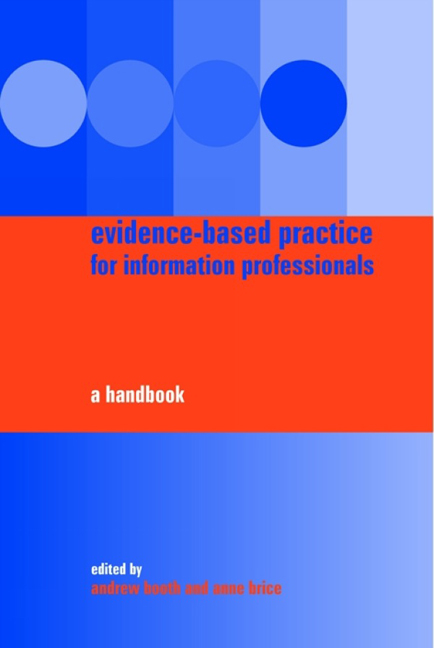Foreword
Published online by Cambridge University Press: 08 June 2018
Summary
Librarians working in healthcare in the late 1990s had the considerable privilege, and indeed pleasure, of witnessing and participating in a revolutionary paradigm, which was to place information management, its associated skills and technologies at centre stage of the delivery of appropriate and effective care. That paradigm, variously identified as ‘evidence-based medicine’, ‘evidence-based healthcare’ or ‘evidence-based practice’ placed a premium on the retrieval of rigorous and reliable evidence to inform clinical decision making.
Had this been the full impact of this new model for ongoing discovery and lifelong learning then you, the reader, probably working in an information sector outside healthcare, would have no need even to open this edited book on evidence based information practice. The fact that you have opened this book bears testimony to the migration of the ‘evidence-based’ model to other sectors including education, social work and management. It also attests to an increasing interest in the evidence base for our own practice. Although much of the trail has been blazed from within the healthcare sector, and is necessarily represented as such in this book, we contend (and many colleagues agree) that this model is equally valid for the sector within which you are working. What is required is the application of the tools and techniques to your specific area of practice, be it in libraries, museums or archives, and its sensitive adaptation to your local culture and environment.
Each Part of the book employs a different approach according to its subject content:
• Part 1 contains comprehensive overview chapters, which represent state-ofthe- art thinking in relation to evidence-based practice with a special focus on the implications for information work. Each chapter is comprehensively referenced to allow access to writings from the wider paradigm.
• Part 2 comprises practically oriented how-to-do-it chapters outlining the process of evidence-based information practice from initiation to evaluation and review.
• Part 3 explores each of the six domains of evidence-based librarianship identified by Crumley and Koufogiannakis, to demonstrate the application of evidence-based information practice to a practical decision-making context. Each chapter begins by reviewing the types of question that might inform each area of professional practice. It then reviews sources of evidence to be used to answer these questions before proceeding to identify some major study-types in each domain.
- Type
- Chapter
- Information
- Evidence-based Practice for Information ProfessionalsA Handbook, pp. vii - viiiPublisher: FacetPrint publication year: 2004



